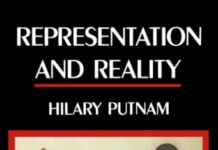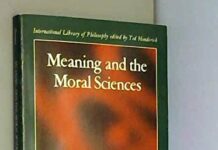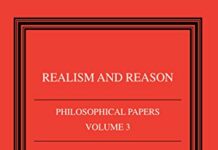
Ebook Info
- Published: 2004
- Number of pages: 208 pages
- Format: PDF
- File Size: 3.64 MB
- Authors: Hilary Putnam
Description
If philosophy has any business in the world, it is the clarification of our thinking and the clearing away of ideas that cloud the mind. In this book, one of the world’s preeminent philosophers takes issue with an idea that has found an all-too-prominent place in popular culture and philosophical thought: the idea that while factual claims can be rationally established or refuted, claims about value are wholly subjective, not capable of being rationally argued for or against. Although it is on occasion important and useful to distinguish between factual claims and value judgments, the distinction becomes, Hilary Putnam argues, positively harmful when identified with a dichotomy between the objective and the purely “subjective.”Putnam explores the arguments that led so much of the analytic philosophy of language, metaphysics, and epistemology to become openly hostile to the idea that talk of value and human flourishing can be right or wrong, rational or irrational; and by which, following philosophy, social sciences such as economics have fallen victim to the bankrupt metaphysics of Logical Positivism. Tracing the problem back to Hume’s conception of a “matter of fact” as well as to Kant’s distinction between “analytic” and “synthetic” judgments, Putnam identifies a path forward in the work of Amartya Sen. Lively, concise, and wise, his book prepares the way for a renewed mutual fruition of philosophy and the social sciences.
User’s Reviews
Editorial Reviews: Review “Hume’s and much 20th-century moral philosophy contrasted moral with factual judgments and led people to conclude that the former, unlike the latter, are subjective in the sense of not being rationally supportable. Putnam…believes that the contrast is ill conceived and that the conclusion is both unwarranted and false. He acknowledges the usefulness of the fact/ value distinction but denies that anything metaphysical follows from it…Putnam covers such matters as imperative logic, economics vis-à-vis ethics, and preference theory and such thinkers as V. Walsh, L. Robbins, and R. M. Hare. A fine philosophical workout.”―Robert Hoffman, Library Journal“In this bold, energetic, and extensive work, Putnam undertakes a revitalization of philosophy. He wants to put philosophy back in touch with the ‘human issues which it has always been philosophy’s highest goal to articulate’…This is exciting and engaging stuff, and anyone with an interest in philosophy, at whatever level, will enjoy it and learn from it.”―Martha Nussbaum, The University of Chicago“This is an excellent collection on a very important issue…These are also very useful contributions, because they guide the reader, particularly the general reader, who is not an expert in either philosophy or science or economics, around the issue, so that one sees its contours, what connects with what, how it ramifies out through different disciplines. The collection as a whole thus fulfils two rather different functions: (a) bringing new and original arguments to bear against the erroneous thesis that there is a dichotomy between fact and value, and (b) guiding the reader around the contours of the issue and pointing to interesting relevant arguments developed elsewhere by others.”―Charles Taylor, Professor of Philosophy at McGill University About the Author Hilary Putnam was Cogan University Professor, Emeritus, at Harvard University.
Reviews from Amazon users which were colected at the time this book was published on the website:
⭐The fact/value dichotomy remains a standing dogma of contemporary empiricism. One sees it assumed without question in numerous works intended both for students and professional philosophers. (It is taken for granted, for instance, in Peter Singer’s recent A Darwinian Left.) Yet Putnam shows that the original dichotomy, usually attributed to David Hume, was based (1) on a metaphysics of fact that nobody has seriously entertained since the early days of Logical Positivism, and (2) on an argument formally identical to Hume’s argument against causality, the latter being an argument virtually nobody now accepts as cogent. Putnam argues that we must now accept the embeddedness of values virtually all theoretical and even factual statements. This does not, however, drop us into a morass of post-modern relativism, but allows us to think more clearly about the value-assumptions we make in all forms of discourse.
⭐As a former student of Hilary’s, I can’t claim my review is free of bias. Nonetheless, in my view the simple insight that the fact/value distinction can be–has been–turned into a dangerous dichotomy is priceless.Of course, there are many other things to like about this book. For one, I’ve gone back to Sen and to Walsh. For another, it’s clarified (for me) many problems (or puzzles) in philosophy and economics.
⭐The fact/value dichotomy of the Logical Positivists “was not based on a serious examination of the nature of values and valuation at all.” p. 29 Things are much more entangled than that and this is a serious study aimed at evaluating that entanglement. This issue seems clearly at the forefront of an examination of narratives and values, and their relationship to the Wittgensteinian “forms of life” — how much value is a result of human creativity, or is all human creativity traceable to facts in the Humean sense?This is a serious argument and I am rereading.
⭐I came to this book hoping for great things. At a high level, Putnam is advancing a theory that few philosophers accept and that, I believe as a pseudo-pragmatist myself, is the right path for philosophy (to wit, the eponymous dichotomy).I left very disappointed. Part of my problem is Putnam’s overbearing tone – he’s frequently obnoxious to philosophers greater than him, and even where he gives credit to his opponents, it often feels patronising. Alfred Ayer, a great logician, is contrasted with ‘greater logical positivists’, Richard Hare (compared to John Mackie) is ‘by far the more sophisticated thinker’, an unnamed economist who spoke to Putnam after a lecture is ‘not without a certain ingenuity’ but then later ‘dumb’ and ‘naive’, and so on.Then there’s his research ethos. Another review says that he doesn’t engage much with contemporary meta-ethics, and I don’t know enough about the field to confirm or deny, but it does seem odd that in a book published in 2002, most of the writings it engages with are from pre-1980. But what bothered me more is his constant self-citation.At age c72, he’s perhaps earned some leeway in this respect, but he quickly burned through my patience for such narcissism. Glancing through the endnotes now, I would guess nearly half of his references, perhaps more, are to himself. Either other people will have advanced similar arguments, in which case I would think it more appropriate to refer to them, or no-one has, in which case the lack of support for the argument in question might have prompted greater reservation – in a less self-absorbed writer.But the main question of course, is whether the philosophy is any good. For the most part, I would say it isn’t. Putnam does advance some a couple of decent arguments, but they’re all tangential to his main theses, and in a book-length work, I don’t think ‘not all the arguments are terrible’ is enough to merit a second star.Putnam frequently puts words in his opponents’ mouths, and at least once massively misrepresents their views in the process. He says that in Hare’s philosophy:’the statement “capital punishment should be abolished,” is equivalent to the imperative “Let us abolish capital punishment,” where this means: “No matter what reasons may be given against doing it, let us abolish capital punishment.”‘A basic understanding of Hare’s utilitarian beliefs renders Putnam’s claim ludicrous: utilitarianism of any flavour, Hare’s included, requires (and indeed is often criticised for requiring) a willingness to make moral trades – to compromise on any moral issue except the most fundamental one of what the ultimate goal is. This misrepresentation is mostly tangential to Putnam’s argument, but since Hare is one of the main dramatis personae in Putnam’s story it’s worrying how profoundly he’s misrepresented.The logical positivists as a whole come under predictable attack, being as a friend once described them, the philosophical whipping boys of the 20th century. I’m not as familiar with their views as with Hare’s, but here too I got the impression Putnam’s portrayal of their position was ungenerous. He claims that for some of them, any claim not directly based on unmodified experience would be meaningless – ie that knowledge gained from looking through a microscope is unscientific if it’s of something we can’t see with the naked eye.Perhaps this is an accurate claim of their beliefs, but the logical positivists comprised some of the greatest logicians of the mid-twentieth century, no less so for the fact that the logical positivism project ultimately failed. I find it extremely hard to believe that any of them would have argued that the claim of Neptune’s existence, for example, was unscientific, and not at all hard to believe that the author of this book would be sloppy and/or ungenerous enough to falsely represent them that way.Ultimately though, my main complaint against Putnam is one that few academic philosophers will sympathise with – his core arguments have essentially the form pilloried so well (IMHO) by Zach Weiner (http://www.smbc-comics.com/?id=2673).More specifically, they generally take the following form:1. Find a topic-relevant word, such as ‘cruel’ (using an actual example from the book)2. Try to break down the word’s use (or rather, examine other people’s attempts to do so) and find that this naturally evolved and imprecise word used by several million native English speakers doesn’t have just one or two set meanings that are easily representable in short phrases.3. Infer from this that the word therefore represents an emergent and indivisible concept, ie ‘cruelty’.4. Since ‘cruelty’ has both descriptive and evaluative content, assert that we’ve now proven the indivisibility of fact and value.This is nothing more than an argument from Putnam’s lack of imagination, yet he writes as though it’s conclusive. Needless to say, Putnam advances other arguments in the book, but many of them have a closely analogous form, and few are any more persuasive.Another weak and recurring argument is his underdefined and overgeneralised concept of ‘a value’. He claims that science requires such ‘values’ as ‘plausibility’, ‘coherence’, and ‘simplicity’. Even though I also believe science presupposes values of a sort, none of these examples seem anywhere near as self-evident as he treats them.’Plausible’, in the mouth of a scientist is shorthand for something like ‘greater than n% probability’, where n would typically be obvious from the context. I suppose you could call that obviousness a value, but in any decisions of practical importance, a scrupulous scientist would consider the actual probability, not some arbitrarily chosen threshold.’Coherence’ can just mean internal consistency, which is extremely well defined (as ‘does not result in contradiction’). It admittedly has fuzzier meanings, but Putnam doesn’t even try to establish that scientists actually rely on these for any part of their activity.Similarly, ‘simplicity’ can mean ‘parsimony’, which is well definable as ‘having low Kolmogorov complexity’. Again, scientists might use it more casually, but again Putnam makes no effort to show that they need do so qua scientists.Lastly, call me pedantic, but I’d have hoped a book on pragmatist philosophy to be a lot more pragmatic! Putnam starts out by urging us to accept this philosophical discussion as having great real world significance but (with the caveat that I skipped a couple of chapters and so might have missed something there) he seems completely uninterested in offering *applications* for his views. He speaks repeatedly of economics, and frequently criticises specific economic theories, but never (that I saw) offers any theories of his own.His views on ethics, when the dust has settled from his attacks on the usual suspects, are decidedly unclear. We’re frequently impressed upon to ‘reflect philosophically’ upon ethical questions, but this is nonsensical in the position he leaves us with – to wit, having (at least, in his view) refuted all the traditional ethical systems. One cannot usefully contemplate a move in a game without knowing either the game’s rules or its victory conditions, yet this is precisely the actively that Putnam thinks ethics should *ideally* comprise.Despite my sympathy with at least some part of his project, I can think of little to say for Putnam’s book. I came to it following a reference in Sam Harris’s The Moral Landscape. I’ve not yet formed a strong opinion of Harris’s overall argument, but honestly I found as much profit in reading the short paragraph in which Harris references Putnam as I did in reading this entire book.
⭐Super livre, incontournable pour ceux qui font de la recherche en épistémologie de la science économique. Putnam, en plus de décloisonner les jugements de fait et de valeur, permet de mieux comprendre les raisons des échecs de l’économie positive.Son compte rendu de la pensée de Sen est aussi très intéressant pour qui ne peut lire ce grand économiste et philosophe dans le texte.
⭐
Keywords
Free Download The Collapse of the Fact/Value Dichotomy and Other Essays in PDF format
The Collapse of the Fact/Value Dichotomy and Other Essays PDF Free Download
Download The Collapse of the Fact/Value Dichotomy and Other Essays 2004 PDF Free
The Collapse of the Fact/Value Dichotomy and Other Essays 2004 PDF Free Download
Download The Collapse of the Fact/Value Dichotomy and Other Essays PDF
Free Download Ebook The Collapse of the Fact/Value Dichotomy and Other Essays





